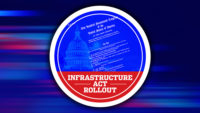Using joint public-private arrangements to build roads can get projects built faster and reduce costs, but there still are a legal, financial and other problems that hamper the spread of such ventures, a U.S. Dept. of Transportation report says.
The DOT report, sent to Congress Dec. 17, says that case studies and two other reports found government-private sector deals can cut construction costs by 6% to 40% and significantly limit the potential for cost overruns." One reason, DOT says, is that companies "have more appropriate incentives to limit costs than the public sector." It adds that the innovative financing in such joint arrangements shows the greatest savings in time. Innovative ways of managing projects also can trim schedules by "months, if not years," it adds.
But there are roadblocks to public-private projects, the report notes, including restrictions in many states on such types of contracting. In addition, it says, localities tend to resist innovative-financing plans that may mean higher costs for motorists and they also are "increasingly reluctant to impose new taxes on themselves to finance facilities."
But DOT's study adds that "public support for tolls that pay for additional capacity or allow motorists to buy their way out of congestion appears to be increasing, and with that, so too should public-private partnership opportunities."
DOT has been an advocate of further use of public-private ventures, and its Federal Highway Administration has launched "Special Experimental Program 15," which it hopes will trim red tape and aid public-private highway projects.
|
The department also included several recommendations in its proposal for reauthorizing the highway and transit programs to help such plans along. The proposals include allowing variable pricing for tolls on highways, bridges and tunnels, including those on the Interstate system, and letting states permit vehicles with one passenger drive on high-occupancy-vehicle lanes, if variable-rate tolls are charged.
The department's bill also would let states and localities issue private, tax-exempt bonds for highways or "surface freight transfer facilities." There would be a $15-billion total national cap on such private-activity bonds.
The legislative proposal also would let states use design-build on small projects, by eliminating the current $50-million minimum size. It also has provisions aimed at expediting projects' environmental reviews.
The fate of these provisions--along with other policy issues and the amount of funding highways and transit will get--are tied up in Congress, which has been unable to pass a successor to the 1998 Transportation Equity Act for the 21st Century, which lapsed in September 2003. Lawmakers failed to agree on a new, multi-year transport bill this session, instead approving a series of short-term extensions to keep the highway and transit programs running. The current extension expires May 31.
The report can be found at www.fhwa.dot.gov/reports/pppdec2004.




